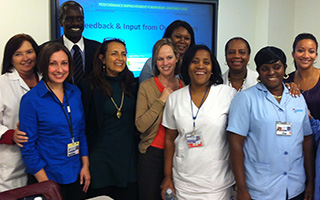As HCAHPS scores become more important for the financial health of hospitals, the need for hospital operations to improve and for hospital staff to be more customer-focused becomes more urgent. In an effort to meet that need, the Labor Management Project’s Patient Centered Care (PCC) initiative has trained thousands of healthcare workers and launched numerous performance improvement initiatives at participating health care facilities.
The first phase of the PCC project, PCC 1.0, ran from 2012 through 2014. Its focus was to improve patient care, improve HCAHPS and CG CAHPS scores for medical centers, provide staff with a better understanding of the changes occurring in the healthcare industry and improve a designated part of a medical center’s operation through a focused performance improvement project.
The LMP expanded the scope of the project in 2015, again with the help of a New York State Health Workforce Retraining Initiative grant funded through the New York State Health Care Reform Act (HCRA). PCC 2.0 added a train-the-trainer element. Its primary focus was finding effective ways to sustain and expand patient-centered care learning throughout participating health care facilities. Both frontline staff and managers received training in how to deliver the PCC curriculum, and proceeded to train hundreds of staff at their home facilities.
Recent statistics provide a snapshot of the PCC program’s accomplishments as of July 2016, including:
- 6,110 hospital and ambulatory staff have received PCC training
- There have been 274 PCC training sessions at 31 acute care and 4 ambulatory care facilities
- 64 staff from 12 institutions have attended three-day train-the-trainer sessions; they have subsequently trained over 1,000 of their colleagues.
- Average scores on the training knowledge tests increased 20 percentage points – from 70% pre-training to 90% post-training
- 19 performance improvement projects were completed, with outcomes including HCAHPS scores that improved by as much as 40 to 60 percentage points; decreases in number of call bells ranging from 24% to 63%; decreases in response time of between 34% and 44%; a decrease in average length of stay from 7.1 to 5.9 days; and a 28.5% decrease in the percent of cases cancelled or delayed.
Here is what some participants had to say about their PCC training on feedback forms:
“This was an excellent day. I feel re-energized and more connected to colleagues. Thank you!”
“The training was awesome. I thought the presenters were very knowledgeable and it was great to learn all the different views from the staff.”
“I would recommend this training to every healthcare employee.”
“Excellent workshop. It should be mandatory for all healthcare workers.”
Several hospitals have viewed the program so favorably that they plan to train their entire workforce – evidence of a strong commitment to sustaining a patient-centered approach to care.
More information about the LMP’s PCC work can be found here and here.
